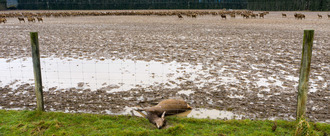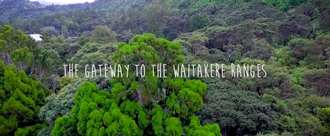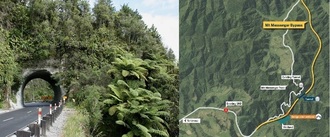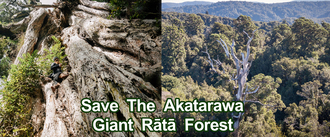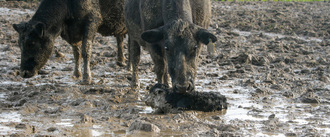-
#TakeawayThrowaways for food and drink: End single-use, return to reuseAotearoa New Zealand has a waste problem that we can’t recycle our way out of. Single-use disposable serviceware belongs to the outdated ‘take-make-dispose’ linear economy, which accelerates our global and local waste crisis, fills up our landfills to produce methane and toxic leachate, and increases litter pollution. Extracting natural resources to make endless streams of single-use items is also unsustainable in the face of resource depletion and climate change, which threaten the planet’s mauri (life-force) and our mauri as descendants of the planet. We need visionary personal, business and policy solutions that prevent and reduce waste in the first place, and that replace throwaways with non-toxic reusable alternatives that work for all people. These upstream solutions will create less waste and fewer greenhouse gas emissions than recycling, composting or landfilling. Transitioning to a circular economy won’t be easy; it makes sense to start with low-hanging fruit. While some single-use items remain unavoidable for some applications (such as certain medical contexts, accessibility needs or civil emergencies), most single-use disposable serviceware for food and drink is relatively easy to prevent if we choose to reuse. Many individuals, businesses and communities in Aotearoa New Zealand are already embracing reusables. We can take this further and mainstream reuse with Government policy that removes throwaway options and replaces them with scaleable and accessible reusable alternatives. We recognise that single-use disposable serviceware often has accessibility-friendly characteristics that enable the independence of people with access needs, including the disabled community, the elderly and young children. Reusable alternatives must balance environmental outcomes with the need to maintain and promote accessibility. Government and business must work meaningfully alongside people with access needs to design products and reuse systems that incorporate universal design principles to function well for everyone. For more information, see the Takeaway Throwaways campaign website. *The time to be bold is now. Ko tēnei te wā.* Until recently, phasing-out throwaway food and drink packaging and serviceware would have seemed radical. However, times are changing. New Zealanders want more action on waste. Banning plastic shopping bags was a first step. New proposals to phase-out PVC and polystyrene takeaway cups and containers prove the Government’s willingness to take action on waste. The time has come to be more ambitious: we must tackle the root of the problem, which is the single-use mindset, not the particular materials involved. The Government has a role not only in taking away a wider range of throwaways, but in boosting the availability and uptake of accessible reusables. When combined, these two actions have the power to mainstream reuse. Ultimately, we are all responsible as kaitiaki for Aotearoa New Zealand and the global environment we depend upon. With integrity, determination, and a collaborative and inclusive spirit we can transform how we serve food and drink ‘on the go’, move our country towards true circular, zero waste solutions, and cast ourselves as a bold, global leader committed to a healthier, greener, more caring and connected world. Follow the Takeaway Throwaways campaign and get involved: http://www.takeawaythrowaways.nz/ http://www.instagram.com/takeawaythrowaways http://www.facebook.com/takeawaythrowaways10,361 of 15,000 SignaturesCreated by Hannah Blumhardt
-
Make OMV clean up its messThis isn’t the first time this kind of deal has happened. The Tui oil field off the coast of Taranaki was recently sold to a small company called Tamarind, which almost immediately went bankrupt. The outcome? A rusty old tanker full of oil was left tethered to undersea well heads of dodgy integrity - risking an environmental disaster - while the Government had to front up $155 million or more of public money to decommission the site. As the Tamarind fiasco shows, oil companies are all too often happy to pocket the profits while leaving the risks with the New Zealand public and Aotearoa environment when things go wrong. Let’s call on Minister Woods to stop such irresponsible behaviour, decline OMV’s Maari sales proposal and ensure that OMV is held responsible for cleaning up the mess it has created. Please sign on to the letter now.2,460 of 3,000 SignaturesCreated by Climate Justice Taranaki
-
Say no to dangerous Methyl Bromide emissions from Port of TaurangaNew Zealand is one of the world’s biggest users of methyl bromide, used mostly for killing insects and pests on logs being exported to China and India. Most fumigations happen at the ports of Tauranga, Whangarei and Napier. Methyl Bromide is a harmful toxic fumigation gas that is banned in most countries around the world as it is known to damage the ozone layer and has serious health effects on humans. It can have neurological and other health effects on humans and there have been several reports of port workers falling ill after being exposed to the gas – which is odourless – during fumigations. Communities in places such as Picton and Nelson believe that clusters of motor neurone disease and cancer were attributable to the use of methyl bromide at the ports. Articles for more information: https://www.stuff.co.nz/national/104267535/nelson-woman-whose-husband-died-of-motor-neurone-disease-says-toxic-methyl-bromide-should-have-been-banned-years-ago https://www.stuff.co.nz/environment/300067460/community-anger-as-deadline-for-controls-around-toxic-gas-methyl-bromide-waived Our community is exposed to this odourless gas every day as Genera's technology can only recapture up to 80% of Methyl Bromide. 20% (40 tonnes per year) is dispersed over surrounding areas of children's sports fields, schools, homes, boaties and the Marae. Because the Port of Tauranga's stormwater drains are sand-based, the Methyl Bromide washes into them and eventually seeps out into our harbour that we fish and swim in, destroying our environment and eco-systems. Genera want to use Ethanedinitrile (EDN) which is a cyanide based fumigant. Cyanides are well absorbed via the gastrointestinal tract or skin and rapidly absorbed via the respiratory tract. Once absorbed, cyanide is rapidly and ubiquitously distributed throughout the body, although the highest levels are typically found in the liver, lungs, blood and brain. Hydrogen cyanide is a colourless or pale blue liquid or gas. In air cyanide is present as gaseous hydrogen cyanide with a small amount present in fine dust particles. Cyanides have the potential to be transported over long distances from their respective emission sources. The lethal exposure for EDN at 267 ppm is immediately fatal therefore much worse than Methyl Bromide where lethal exposure is 7,900 ppm at 1.5hrs. In addition, EDN is extremely explosive with a detonation velocity of 2,500 m/sec. If there was a detonation at the Port of Tauranga in a ship that had been fumigated with EDN the explosion would be larger than the recent explosion in Beirut. The solution to the problem of fumigating at the Port of Tauranga is to remove all fumigation to industrial zones such as the Rangiuru Business Park where fumigation would take place in airtight sheds on rail wagons (99.9996% destruction rate) with the fumigated logs being transported to the Port of Tauranga for immediate loading into the ships. For the immediate and long term health of our families and eco-system, please sign this petition to indicate your opposition to Genera Limited's resource consent application RM19-0663 and ban all Methyl Bromide fumigation at the Port of Tauranga.930 of 1,000 SignaturesCreated by Clear the Air Mount Maunganui
-
Stop Intensive Winter Grazing: Get animals out of mud on our Pāmu farms and save our riversPāmu (AKA Landcorp Farms) belongs to all New Zealanders and we, the public, are all stakeholders with a right to say what is done on our behalf. Intensive Winter Grazing (IWG) is cruel to animals, it’s polluting our rivers, streams, estuaries and groundwater, and it is damaging the reputation of Aotearoa New Zealand. The practice of confining large numbers of animals into a small area over winter churns paddocks to a deep slurry of mud, faeces and urine. The toxic runoff pollutes our waterways and kills freshwater life in rivers and estuaries. As well as pollution, there are serious animal welfare problems associated with the practice as this recently released graphic footage of cows being forced to give birth in the freezing mud shows. There are better ways to farm. Pāmu should lead by example, end intensive winter grazing and shift to less intensive land use. Pāmu can do this and still make money - their own modelling proves it. This practice is very stressful on individual Pāmu farm managers and staff. Taking the pressure off them will improve wellbeing and mental health. More Information: Freshwater pollution: Nitrate leaches into our aquifers at up to 10 times the rate of normal grazing, destroying groundwater for future use and remaining for hundreds of years. Phosphate and pathogen-rich effluent runs off into streams, rivers, lakes and estuaries, making them unswimmable, and killing ecosystems. Animal suffering: When it rains the land on which these animals are grazed turns to mud, leaving heavily pregnant mothers with nowhere dry to rest and give birth. They get exhausted and end up drinking muddy water to hydrate. Dry paddocks are often full of boulders which are painful to stand on. Soil degradation and loss: IWG destroys the soil and releases tonnes of stored carbon into the atmosphere, accelerating climate breakdown. It’s practice is heavily dependent on pesticides, herbicides and synthetic fertilisers which are causing severe decline in biodiversity and human health. It’s also the cause of huge loss of valuable topsoil. #EndIntensiveWinterGrazing1,179 of 2,000 SignaturesCreated by Geoff Reid

-
Stop Watercare! Say NO to the destruction of native bush in Titirangi for a water treatment planthttps://www.youtube.com/embed/wjX954J1zjI Watercare is proposing to build a new massive water treatment plant in Manuka Road and Woodlands Park Road, Titirangi, next to the existing plant. The construction of this plant will destroy more than 1000 trees over four hectares of significant native mature bush – including a large part of the very popular Clark Bush Track, bring an industrial sized plant to within four metres of local residents and put untold strain on roading and other infrastructure in surrounding communities including Titirangi, Woodlands Park, Waima, Laingholm, Glen Eden and beyond. The ecological assessment of the proposed site has been limited to minimal vegetation and bird count surveys, with no assessment of the other flora and fauna that might be present, including bats, lizards or insects, and no considerations of impacts on fresh water ecology. If this project goes ahead in Titirangi, it would be an ecological and social disaster, an insult to the environmental pioneers that helped create the essential character of Titirangi and an absolute disgrace for the green image of New Zealand. Phil Goff promised Aucklanders to protect our native heritage trees. Now he has the chance to stand by his word when both our native bush and community are under threat. We call on him and Auckland Council to reject the environmental consent to clear the bush for a Water Treatment Plant in Titirangi and send Watercare back to the drawing board. Help us stop Watercare now. For additional information, please check our Facebook page and website below: https://www.facebook.com/groups/TitirangiPG/3,238 of 4,000 SignaturesCreated by Titirangi Protection Group
-
No Mt Messenger Bypass - save Mangapēpeke ValleyThis new road will damage the "physically, spiritually and socially significant" Mimitangiatua River and Mangapēpeke Stream of Ngāti Mutunga, Ngāti Tama and Poutama. It will destroy 44.4 hectares of indigenous forest and wetlands that are home to dozens of threatened native species such as the North Island Brown Kiwi, Archey's frog, Long-tail Bats, Fernbirds, North Island Robins, Giant Kōkopu and Shining Cuckoo. This proposal is opposed by the Department of Conservation, Forest & Bird and landowners who are being forced from their homes. Some iwi are yet to be fully consulted and other iwi are still deciding, being so far unsatisfied with mitigation offers. Mangapēpeke means 'frog stream' and frogs are a well known environmental health indicator species. No amount of proposed tree planting and pest control can mitigate the damage actual forest removal and pest introduction this road will cause. The 'bypass' should not go ahead. It makes no sense to destroy ancient forest communities just so cars and trucks can get from A to B a few minutes quicker. The touted safety improvements do not stack up when well-known fog and black ice in the proposed area is taken into account. Nor when increased speeds will also increase accident rates. The age of large truck transportation is coming to an end as fossil fuels become ethically unaffordable. So let's be practical, do we really need a brand new $200million road? It is time to move on from fossil road projects and create a vibrant, sustainable Taranaki economy. An upgrade of the existing road makes far more sense.20,577 of 25,000 SignaturesCreated by EBailey & MDoorbar
-
Save the world’s last Giant Rātā ForestHidden in the Akatarawa Forest is one of Wellington’s best kept secrets, a living treasure equal to anything found in our national museum, Te Papa. A forest of giant Rātā trees with trunks that rival Aotearoa’s iconic kauri tree, Tāne Mahuta. These living relics are undoubtedly national treasures that have been standing for centuries before the arrival of humans to Aotearoa. Remnant Northern Rātā are iconic lowland forest trees that are now rare as they are endangered by introduced possums. One of NZ’s tallest forest trees, healthy Rātā produce a blaze of red flowers in summer, rich in nectar that supports tui, bellbirds, kākā, geckos and bats with high energy food. Rātā trees begin life as a seedling in the crown of other forest giants like Rimu. Rātā roots descend and eventually, over a few centuries, strangle their hosts to form trunks of their own. Strangler trees are a special feature of tropical and warm temperate rainforests but Rātā trees stand out internationally as having some of the largest root trunks of any species on earth. They are truly spectacular! Among the Akatarawa Giants two of the known trees have a girth exceeding that of NZ’s most iconic kauri tree, Tāne Mahuta! We can build a Te Papa Tongarewa any day but it takes hundreds of years to replace one of these giants! If we drop the ball on possum control for just a few short years the real cost is centuries of living heritage. Most of the juvenile rātā trees have already been killed by possums in the absence of a regular control programme. Greater Wellington Regional Council has a custodial duty to ensure this unique living treasure is protected by sustained possum control to ensure its survival. These are the last such ancient giants on earth!! We implore the council to assign a sustained budget to protect the integrity of the Akatarawa Giant Rātā Forest!6,977 of 7,000 SignaturesCreated by Geoff Reid

-
End all NZ Super Fund Investments in Intensive Winter GrazingOur nation’s global reputation relies on a government that puts the health of its environment and people's wellbeing first. Spending millions of dollars from the nation’s pension fund on farms that practice Intensive Winter Grazing is one of the most unethical choices the Superannuation investment fund has EVER made! In contrast to traditional grazing, Intensive Winter Grazing restricts animals to small patches of land for long periods, which quickly turn into mud. This practice causes freshwater pollution, animal suffering and soil degradation. Freshwater pollution: Nitrate leaches into our aquifers at over 10 times the rate of normal grazing, destroying groundwater for future use and remaining for hundreds of years. Phosphate- and pathogen-rich effluent runs off into streams, rivers, lakes and estuaries, making them un-swimmable, and killing ecosystems. Animal suffering: The land these animals are grazed on turns to mud, which leaves animals with nowhere dry to rest and give birth. They often end up licking mud to get water. Soil degradation: Intensive Winter Grazing destroys the soil and releases tonnes of stored carbon into the atmosphere, accelerating climate breakdown. This practice is heavily dependant on pesticides, herbicides and synthetic fertilisers which are causing severe decline in biodiversity and human health. This is no way to be ‘investing for the next generation’. Please sign and share this petition with your networks Email the minister responsible: Hon Grant Robertson, Minister of Finance. [email protected] Tell him to; Stop investing any of the New Zealand Super Fund into farms that are winter crop grazing, divest from any that continue, and find sustainable alternatives immediately! #EndIntensiveWinterGrazing7,452 of 8,000 SignaturesCreated by Geoff Reid

-
Bring back general tree protectionAll over Aotearoa, our big old trees are being cut down at an alarming rate. They need to be protected. We face a climate and ecological crisis that puts all of our futures at risk, but especially our younger generations. As our towns and cities become more densely populated and green spaces disappear, people are losing touch with nature, and we’re losing the old trees that provide much needed resilience in the face of climate change and ecological collapse. These big trees are home to kereru, tui, kotare and countless other birds and insects - and they provide a priceless community asset, a place of shelter, recreation and connection. They clean the air, they keep us cool in summer, they store carbon and they make great places to play. Up to one third of Auckland's urban trees have been destroyed since the last National Government removed general tree protection in 2012. The senseless destruction of part of an irreplaceable stand of old native trees at Canal Road in Avondale is just the most recent example of why we need to reinstate tree protection. A community protest to halt any further felling has been ongoing there since 8 July 2020. The site, at 52-58 Canal Road, has a unique collection of native trees planted in the 1920s. Even though half have been cut down, over 23 significant trees remain including two rare black maire and a kawaka as well as other natives like totara, tawa, titoki, and puriri. The protest began when local man William Lee stood in front of a wood chipper and refused to move shortly after the first trees were felled. Since then, many have joined him, dozens have sat in trees and stood watch by day and night, and six people have been arrested for peaceful protest. The story has gained nationwide interest and inspired our call for bringing back general tree protection.10,113 of 15,000 SignaturesCreated by Juressa Lee




